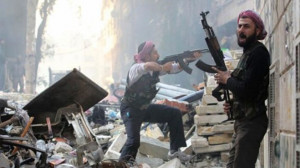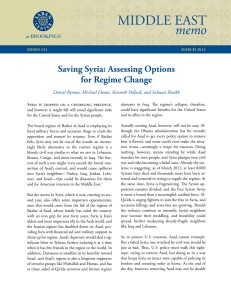
While the Turkish government maintains the Syrian plane entered Turkish airspace, it came down in Syrian territory with its pilot having safely ejected from the downed aircraft and also recovered on Syrian soil. Reuters reported in its article, “Turkey shoots down Syrian plane it says violated air space,” that:
A Turkish F-16 fired a rocket at the Syrian jet and it crashed around 1,200 meters (1,300 yards) inside Syrian territory.
Clearly the Turkish government knew Syrian forces were engaging militants Ankara itself was harboring in its territory and any cross-border pursuits carried out by Syria posed no threat to the security of Turkey any more than the cross-boarder pursuits the Turkish government regularly conducts in northern Iraq against Kurdish militants. Instead, it appears that Turkish warplanes were in fact providing air cover for the militants crossing over into Syria.
More alarming is the fact that the militants have been identified across the Western media as hailing from the US State Department designated terrorist organization Jabhat Al Nusra – Al Qaeda’s Syrian franchise. The Wall Street Journal’s Middle East RealTime reported in a post titled, “Latakia Offensive Stirs Dark Memories for Armenian-Syrians,”that:
When hardline Islamist rebels took over swaths of Latakia province this week, it provided them with their first outpost on the Mediterranean Sea.
The military offensive was symbolic for several reasons: rebels from al Nusra Front taking over northern parts of Bashar al Assad’s hometown province while the Turkish air force shot down a regime war plane trying to bombard the rebel advancement, as it flew near their shared border. Nusra is al Qaeda’s sanctioned offshoot in Syria.
A NATO member providing air support for Al Qaeda incursions into a neighboring country could not be a more egregious violation of national sovereignty or international law. Yet Turkey has apparently not stopped there in seeking to escalate tensions with Syria. A recently leaked conversation between the head of Turkish intelligence, Hakan Fidan, and Turkish Foreign Minister, Ahmet Davutoğlu, reveals Turkey’s plans to stage a false flag attack on Turkey itself to provoke war with Syria.
The International Business Times reported in its article, “Turkey YouTube Ban: Full Transcript of Leaked Syria ‘War’ Conversation Between Erdogan Officials,” that:
Turkish Prime Minister Recep Tayyip Erdogan’s ban of YouTube occurred after a leaked conversation between Head of Turkish Intelligence Hakan Fidan and Turkish Foreign Minister Ahmet Davutoğlu that he wanted removed from the video-sharing website.
The leaked call details Erdogan’s thoughts that an attack on Syria “must be seen as an opportunity for us [Turkey]”.
In the conversation, intelligence chief Fidan says that he will send four men from Syria to attack Turkey to “make up a cause of war”.
Deputy Chief of Staff Lt. Gen. Yaşar Güler replies that Fidan’s projected actions are “a direct cause of war…what you’re going to do is a direct cause of war”.
Turkey’s foreign ministry said the leaked recording of top officials discussing the Syria operation was “partially manipulated” and is a “wretched attack” on national security.
In the leaked video, Fidan is discussing with Davutoğlu, Güler and other officials a possible operation within Syria to secure the tomb of Suleyman Shah, grandfather of the founder of the Ottoman empire.
The astounding revelation has been all but buried by the Western media who has instead intentionally focused solely on Turkey’s banning of Facebook and Twitter to cover up what it only refers to as “corruption.” Turkey’s use of a self-inflicted attack to justify direct military involvement in Syria risks triggering a greater regional conflict involving Turkey and by extension, NATO’s primarily Western membership – a scenario the West has been seeking almost as soon as the conflict in Syria first started in 2011.
Western intervention, even if limited in the north of Syria via Turkey, would allow for the creation of Western occupied “buffer zones” within Syrian territory, long desired by the West since at least as early as 2012 by US policy makers, particularly those among the corporate-funded Brookings Institution from which many of America’s military adventures have been designed.
The idea of establishing a “buffer zone” is meant to look like a knee-jerk reaction to violence along the Syrian-Turkish border and was described in detail by the Brookings Institution in their March 2012 “Middle East Memo #21” “Assessing Options for Regime Change” where it stated specifically (emphasis added):
“An alternative is for diplomatic efforts to focus first on how to end the violence and how to gain humanitarian access, as is being done under Annan’s leadership. This may lead to the creation of safe-havens and humanitarian corridors, which would have to be backed by limited military power. This would, of course, fall short of U.S. goals for Syria and could preserve Asad in power. From that starting point, however, it is possible that a broad coalition with the appropriate international mandate could add further coercive action to its efforts.”

The Brookings Institution, Middle East Memo #21, makes no secret that the humanitarian “responsibility to protect” is but a pretext for long-planned regime change.
Aiding and abetting Al Qaeda, providing armed terrorists with air support, and planning to intentionally provoke a war with Syria through a premeditated, self-inflicted and now fully revealed attack designed to frame Damascus – all carried out in plain view as the world looks on illustrates the dangerous desperation the West now finds itself in as its designs for global hegemony take a turn for the worse.
While Turkey stands to take the fall for the recent and blatant serial acts of war against neighboring Syria, its membership in NATO and NATO’s subsequent failure to condemn Turkey for its actions implicates the entire military alliance as complicit. Ironic indeed is the fact that while NATO coddles, arms, and provides air cover for Al Qaeda along the Syrian-Turkish border, it uses the presence of Al Qaeda in Afghanistan to justify its continued occupation there as well as cross-border raids into neighboring Pakistan.
At each pivotal juncture during the ongoing Syrian conflict, the West has expended heavily its credibility and reputation while straining the “international norms” it has worked for decades to establish. As the West fails at each of these junctures, the momentum it had relied upon so heavily starting in 2011 is further diminished. The battle in Kassab, and the lesser mentioned “Southern Front” along the southern Syrian-Jordanian border that appears to have already collapsed under Syrian counterattacks, appears to be the last battle by NATO and its proxies for Syria.
Syria’s military appears fully capable of stopping the militants flowing over its borders and has exhibited infinite patience against NATO’s provocations. With Turkey revealed to be planning attacks on its own territory to provoke war with Syria, any attempt to actually carry out a false flag attack now would only further weaken both Turkey and NATO’s hand. Even if the West was able to establish “buffer zones” in northern Syria, the price they pay in credibility, reputation, and legitimacy would make any such “victory” Pyrrhic.
As with all empires throughout human history, there is a defining moment when decline becomes irreversible and the demise of an empire imminent. For “Pax Americana” and the elite sitting on Wall Street and in the City of London, that moment might be the Battle for Kassab and the ignominious end of the West’s attempted regime change in Syria.
Tony Cartalucci, Bangkok-based geopolitical researcher and writer, especially for the online magazine “New Eastern Outlook”
